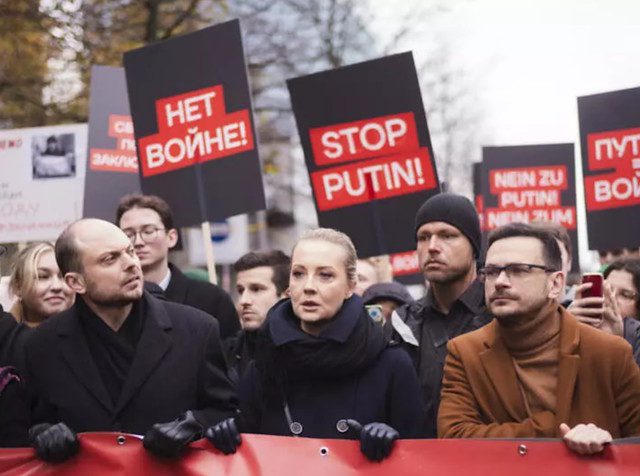The wife of former Russian opposition leader Alexei Navalny says foreign laboratory tests indicate her husband was poisoned.
Navalny, 47, died on February 16, 2024, in a Russian prison in the Arctic Circle. In February 2024, Russia’s prison service reported that Navalny had died after feeling unwell following a walk around the high-security facility where he was serving a combined 30 1⁄2-year jail sentence.
Since then, Yulia Navalnaya, his wife, has led a campaign against official corruption and President Putin’s government. She has publicly challenged the claims made by the Russian prison service, arguing that Navalny had been subjected to continued oppression under the regime and had survived several previous poisoning attempts.
Navalnaya wrote on X that “we managed to transfer Alexei’s biological materials abroad.”
She later confirmed that “laboratories in two different countries conducted examinations. These laboratories, independently of each other, concluded that Alexei was poisoned.”

Image: President Joe Biden speaks with Yulia Navalnaya, right, the widow of Russian opposition figure Alexei Navalny, and her daughter Dasha – Adam Schultz – The White House
No further details were given about the tests or which countries were involved. In a video message, she confirmed that her husband’s biological materials were “smuggled abroad.”
Who Was Alexei Navalny?
Alexei Navalny was a prominent political opponent of Russian President Vladimir Putin throughout the 21st century. A trained lawyer turned anti-corruption activist, Navalny gained national and international attention for exposing sophisticated corruption networks within Russia’s elite.
Through his investigations, speeches, and defiance of the Kremlin, Navalny became a symbol of resistance in an increasingly authoritarian Russia.
He first rose to prominence in the late 2000s through his blog and YouTube investigations, which exposed graft in major Russian companies and government ministries. This led him to found the Anti-Corruption Foundation (FBK), which published several viral documentaries, including one alleging that Vladimir Putin owned a secret $1 billion palace on the Black Sea.
Despite constant legal pressure and arrests, Navalny attempted to run for several public offices, most notably the presidency, though the government blocked his campaigns. He organised mass protests across the country, particularly during the disputed elections of 2011–2012, which brought tens of thousands of people into the streets against Putin’s regime. Navalny’s use of digital platforms helped mobilise younger Russians and made him a dangerous challenger to the Kremlin.
In 2020, Navalny was poisoned with a military-grade nerve agent, Novichok, the same substance used in the Salisbury poisonings in 2018. He survived after being evacuated from Siberia to Germany and accused Russian security services of being behind the attack. Despite the threats to his life, he returned to Russia in 2021 and was immediately arrested. Over the following years, he faced a series of trials widely condemned as politically motivated. His charges included fraud, extremism, and parole violations, resulting in a sentence of more than 30 years under harsh prison conditions.
It was there that Navalny died in February 2024. While Moscow claimed he collapsed during a walk, human rights organisations, foreign governments, and his supporters all blamed the Kremlin. His widow, Yulia Navalnaya, and others vowed to continue his legacy, calling his death a political murder intended to silence dissent.
Outrage in Response to His Death
News of Navalny’s death drew condemnation from across the West, with many leaders blaming Putin.
U.S. President Joe Biden said he was “both not surprised and outraged.”

Image: Prime Minister Rishi Sunak attends NATO summit alongside Ursula von der Leyen – Simon Dawson – No 10 Downing Street
Former British Prime Minister Rishi Sunak and EU Commission President Ursula von der Leyen also “expressed their outrage” at Navalny’s death and agreed that those responsible must be held to account.
In the following month, the European Union imposed sanctions on 33 individuals and two penal colonies linked to Navalny’s death under its Global Human Rights Sanctions Regime. The sanctions include asset freezes, travel bans to the EU, and prohibitions on the provision of financial resources to those sanctioned.
Specific entities sanctioned include the prisons IK-6 and IK-3, where Navalny was held, as well as officials in the penitentiary and judicial systems involved in decisions affecting him.
The UK also imposed sanctions on six senior officials from the Arctic penal colony where Navalny died. These sanctions included travel bans and asset freezes.
Navalnaya accused the Kremlin of hiding his body to cover up the circumstances of his death. His body was eventually returned a week later, and thousands turned out to mourn him at a funeral in Moscow.
Following an initial inquiry into his death, Navalnaya “demanded that the laboratories that conducted the analyses publish their results” before accusing them of “pandering to Putin on account of so-called higher considerations.”
Speaking to NBC News, Kremlin spokesman Dmitry Peskov said: “I don’t know anything about these statements of hers, and I can’t say anything on this.”
Featured Image via Trong Khiem Nguyen (Flickr)

